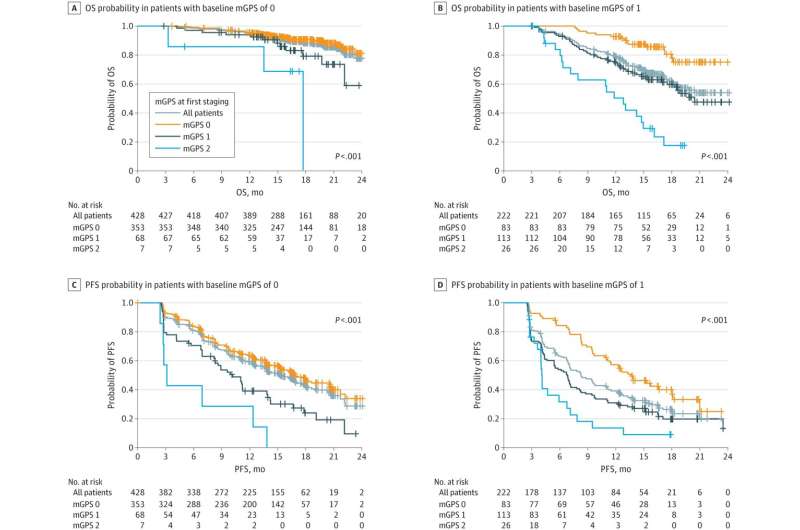This article has been reviewed according to Science X's editorial process and policies. Editors have highlighted the following attributes while ensuring the content's credibility:
fact-checked
peer-reviewed publication
proofread
Study improves prediction of therapy response in patients with metastatic renal cell carcinoma

Dr. Niklas Klümper, resident at the Department of Urology of the University Hospital Bonn (UKB) and working group leader at the Institute for Experimental Oncology (IEO), and Dr. Jonas Saal, resident at the Medical Clinic III for Hematology and Oncology of the UKB, demonstrated a significant improvement in predicting the response to therapy in metastatic renal cell carcinoma by incorporating the level of inflammation, which was assessed using two straightforward blood parameters, alongside the conventional imaging-based approach.
Renal cell carcinoma is the most common form of kidney cancer. To treat metastatic renal cancer, combinations of immunotherapies are used as the first line of treatment. These are designed to activate the patient's immune system to recognize and fight malignant cancer cells. These highly effective first-line therapies currently achieve disease control in over 80% of patients with metastatic renal cell carcinoma.
Reliable prediction of response to treatment is critical for optimal patient management. However, in daily clinical practice, only imaging (usually by computed tomography (CT)) with vague estimation of tumor volume is used to evaluate treatment response. However, looking at tumor volume alone does not adequately predict who will benefit from immunotherapy in the long term. Complementary markers to predict further disease progression are therefore essential to further optimize and guide therapy.
Improvement of the therapy response in the blood
The research group led by Dr. Klümper has now been able to show that the investigation of two inexpensive and widely available inflammatory markers in the blood (C-reactive protein (CRP) and albumin) significantly improves the prediction of therapy response in patients with metastatic renal cell carcinoma, especially in the large group of patients with disease control in the first follow-up (>80%). The authors concluded that both radiologic imaging and complementary analysis of inflammation levels should be used for monitoring in patients with metastatic renal cell carcinoma in the future.
"Our novel approach for enhanced therapy monitoring and prediction of treatment response is based on the combination of imaging and the assessment of inflammation level through the collection of two simple blood parameters: CRP and albumin integrated into the well-known modified Glasgow Prognosis Score (mGPS). Our study's findings are derived from patient cohorts participating in two separate randomized trials focused on metastatic renal cell carcinoma. These results strongly advocate for the immediate implementation of the mGPS as a prognostic tool for predicting outcomes in individuals diagnosed with metastatic renal cell carcinoma," said Dr. Niklas Klümper.
The mGPS is determined by assigning one point for an elevated serum CRP concentration (> 10 mg/L) and, only in patients with elevated CRP, a second point for decreased serum albumin (< 35 g/L). Patients are then categorized as low risk (0 points), intermediate risk (1 point), and high risk (2 points).
"Both blood parameters are widely available and inexpensive to determine, and thus can be immediately integrated into clinical practice worldwide to improve therapy monitoring of cancer patients. Improved prediction of treatment failure could better identify patients who could benefit from a change or intensification of therapy. This concept needs to be explored in future studies," said Dr. Jonas Saal.
The study was published in JAMA Oncology.
More information: Jonas Saal et al, Integrating On-Treatment Modified Glasgow Prognostic Score (mGPS) and Imaging to Predict Response and Outcomes in Metastatic Renal Cell Carcinoma, JAMA Oncology (2023). DOI: 10.1001/jamaoncol.2023.1822. jamanetwork.com/journals/jamao … /fullarticle/2806576



















